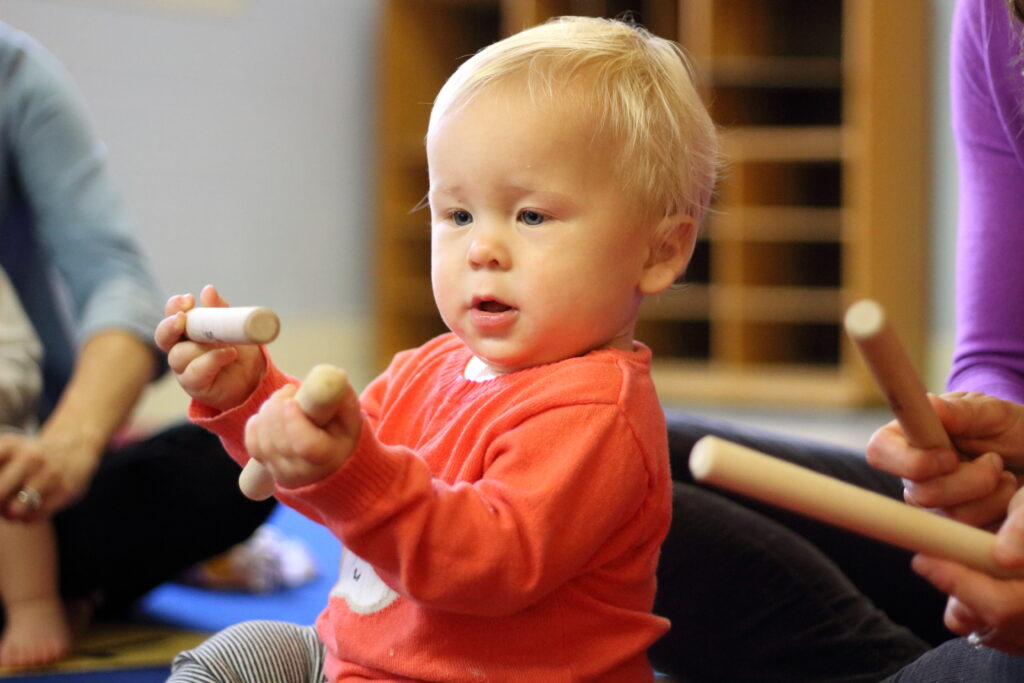In this third installment of our series on The Nature of the Young Child, we continue to explore how children learn during the first phases of life, and how the first three years in particular are critical. Based on the pedagogical philosophy of acclaimed educator Maria Montessori to “follow the child,” there are several experiences that influence sensory and motor development for neurological organization. Caregivers and children’s music teachers can see how music has a role to play in this vital stage of childhood development.
Children Learn Through Movement
Once they have learned to walk, toddlers spend much of their time exploring the world around them. Any parent can tell you that they are constantly on the move, learning to obtain control of their body movements. As a prerequisite to cognitive learning, sensorimotor integration is one of the earliest ways that babies and toddlers learn about their world. From reaching and grasping to crawling and walking, children are explorers by nature. Through repetition and practice, the toddler begins to unconsciously strengthen body to mind neural connections. Kinesthetic awareness, an inner sense that operates below the conscious level, contributes information about how the body feels as it moves. Such awareness is invaluable to all learning, including music – through movements such as clapping, tapping, bouncing, or dancing.
Listening is the Most Important Sensory Channel for Learning
Formed in utero, the ear is functional at four months after conception, allowing the fetus to begin hearing their mother’s breathing, heartbeat, digestion, talking, and singing. The ear is an organ that never rests, and listening is important to almost all aspects of learning – physical, social, emotional, and intellectual. Music helps children to focus their attention on familiar sounds, whether it is a lullaby sung by a parent or a children’s music class, and helps to teach appropriate interaction with adults and peers.
Shaping Language is the Child’s Great Work
At the earliest stages of life, children understand that speaking is what constitutes communication in their world. Sounds that come from the mouth such as cooing are very fascinating to babies, eliciting excited responses that begin a back and forth form of communication. In the beginning, tone and inflection are even more important than the words themselves, and infants will imitate and practice sounds as they become excited about their own vocalizations. Music offers a very strong source of pleasure for children, as it soothes, elicits attention, and stimulates response. The rhythm, repetition, and rhyming of music all contribute to a child’s language development as they are allowed to sing to themselves, make up words, and silly noises.
Children Have a Natural Tendency for Order
As children experience the massive amount of information coming through their senses, they begin to sort, order, classify and categorize. Remarkable because it is not based on any previous experience, this process helps children to understand their environment and how to put persons and things in their accustomed place. Maria Montessori understood this, and once order is established around the age of 3.5 years, change is better tolerated in the external environment. Music participation and education also helps establish a sense of order through repetition and routine of familiar songs and movements.

Independence and Initiative are the Embodiment of Learning
As children develop through movement and language, they are also beginning to move from total dependence on their caregiver towards a growing sense of self. Parents fully understand the “strong will” of a toddler, and at around 2 years of age, they love to participate in self-chosen tasks. Insisting on completing tasks alone, toddlers are showing a desire to free themselves from dependency. Music can provide a valuable tool for children to explore their independence. For example, playing different developmentally appropriate instruments presents cause and effect as they see what sounds they can make with them.
Repetition is Essential to Learning
Children love to repeat enjoyable experiences, and this is an important aspect of both learning and teaching. While allowing them to enjoy the experience over and over, the repeated action boosts both cognitive as well as muscle memory. Often with deep concentration, children repeat tasks of their own choosing until they have mastered it and established control. It is then that they look for other ways to put the actions to work. Music is a wonderful tool for providing children with both a repetitive learning task, but also a means by which to take those tasks and add their own creativity.
In the first years of life, children use these mechanisms to understand their world and grow to free themselves of total dependence on others. Music, along with movement, can provide caregivers and early childhood music teachers with powerful tools to assist in this crucial stage of child development. In our next blog, we will explore the role of adults in the child’s environment, and how to encourage these mechanisms for both the physical and psychological well-being of the child.
Much of the content for this post was based on the introduction to Family Music for Babies and Family Music for Toddlers, an early childhood music curriculum developed by Musikgarten.





